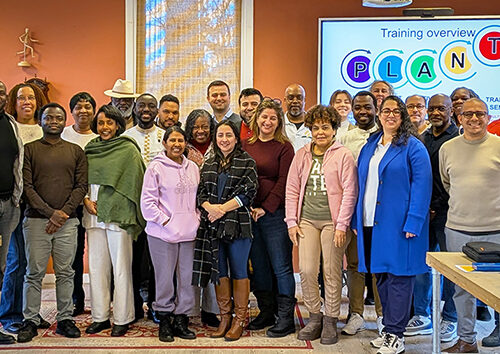30 October 2017 | Belgrade, Serbia [Jimmy Botha / tedNEWS] “The gospel of Luke now is more meaningful to me then it was before,” states Bertold Hibner, pastor of the Vilnius Seventh-day Adventist Church in Lithuania. That was his surprising response to a question on the benefits of the MA in Leadership module he just completed, 22-26 October, in Belgrade, Serbia.
 As leaders they discussed passages from Luke chapters 4 and 10 to show how Jesus connected His own mission to the covenant God had established with His people. “It appears that Jesus was assessing organisational health,” Hibner explained. The lectures went into a lot more depth, looking at how to assess the health of an organisation, how to implement change that may be needed, what resources might be available, and equally, how to deal with resistance.
As leaders they discussed passages from Luke chapters 4 and 10 to show how Jesus connected His own mission to the covenant God had established with His people. “It appears that Jesus was assessing organisational health,” Hibner explained. The lectures went into a lot more depth, looking at how to assess the health of an organisation, how to implement change that may be needed, what resources might be available, and equally, how to deal with resistance.
Hibner is among the first of two cohorts of students that started in 2016 and 2017 respectively, with the TED MA in Leadership course offered by Andrews University via Newbold College of Higher Education. The full cohort met together at Holiday Inn in Belgrade for the autumn module a comfortable venue providing shelter against the rain and cold of the Serbian autumn.
The syllabus is different from courses you would find in most universities. Classes have a structure that seeks to help students understand the vast world of leadership through practical methods.
Throughout the week, lots of discussions lead towards the ingredients for eventually compiling a portfolio containing papers and learning. This will be the completed product.
 This works well for Karen Holford, TED Family Ministries director. The structure allowed her time to get to know other leaders better, strengthening relationships in order to share and inspire.
This works well for Karen Holford, TED Family Ministries director. The structure allowed her time to get to know other leaders better, strengthening relationships in order to share and inspire.
Torben Bergland, TED Health director, believes that such a structure of networks and relationships builds trust and can have a positive impact on the future. He was intrigued by concept of ‘appreciative inquiry’ as a leadership principle and method. It proposes that excessive focus on problems and problem solving can actually cause organisations to become worse or fail to become better. Instead, when all members of an organization are motivated to understand and value the most favourable features of its culture, it can make rapid improvements.
 With the four-day intensive over, the participants head back to their respective homes, continue in their current leadership roles while improving their strategies from what they have learnt, and working in practical ways to complete their studies. Their families, churches and conferences where they work, should notice that they are busy with important work, not just because they look busy, but because increasingly they will also shine as leaders.
With the four-day intensive over, the participants head back to their respective homes, continue in their current leadership roles while improving their strategies from what they have learnt, and working in practical ways to complete their studies. Their families, churches and conferences where they work, should notice that they are busy with important work, not just because they look busy, but because increasingly they will also shine as leaders.
To aid the process, students also belong to small groups, called Leader Learning Groups. They meet once a month in order to support each other. Accountability is key here, and this aspect brings the course to life.
 “It was a privilege to be together with other Adventist leaders from around Europe and grapple with leadership issues we have in common, sharing honestly and prayerfully with each other, encouraging one another and experiencing God’ presence,” states Norwegian Union President, Victor Marley. “I go back to my task, with renewed energy and with tools that can be used in my context.”
“It was a privilege to be together with other Adventist leaders from around Europe and grapple with leadership issues we have in common, sharing honestly and prayerfully with each other, encouraging one another and experiencing God’ presence,” states Norwegian Union President, Victor Marley. “I go back to my task, with renewed energy and with tools that can be used in my context.”
The 2016 cohort is aiming to finish their course in 2019 with the 2017 cohort finishing a year later. They next meet as a complete group for the June 2018 class at Newbold College.
With networking and relationships being so important, memories of the Belgrade meetings are highlighted in a Facebook picture gallery. [tedNEWS]
See also:
New MA programme already transforming leadership across the TED
tedNEWS Staff: Victor Hulbert, editor; Deana Stojkovic, associate editor
119 St Peter’s Street, St Albans, Herts, AL1 3EY, England
E-mail: [email protected]
Website: www.ted.adventist.org
tedNEWS is an information bulletin issued by the communication department of the Seventh-day Adventist Church in the Trans-European Division.



